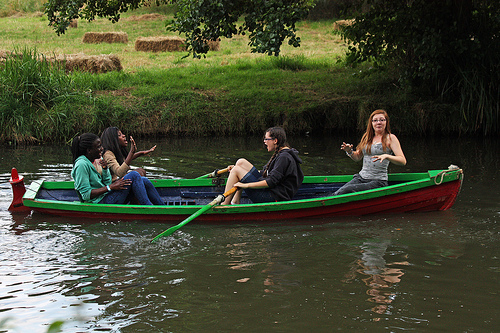Only the guy who isn’t rowing has time to rock the boat. – Jean-Paul Sartre
What does that mean?
If you have ever rowed a boat, you know it’s a pretty intense job. Even something as simple as paddling a canoe keeps you busy most of the time.
To ‘rock the boat’ is both a literal and figurative expression. Any boat small enough to row is also small enough to capsize fairly easily. Rocking the boat isn’t a good idea.
Figuratively, rocking the boat means that someone is making trouble. If you are busy rowing, you have no time or energy left over to rock the boat.
So if you are making trouble, you are in that position because you have time on your hands. The quote implies that’s because you aren’t rowing, but should be.
Why is not rocking the boat important?
While the rebel in me says the boat needs to be rocked from time to time, that isn’t the point of this quote. The time to challenge authority is when the boat is safely in port, and you aren’t endangering the lives and safety of others. The same goes for arguing about the direction and destination of the boat. Do it in port.
That said, the people who rock the boat are usually trouble makers. Sometimes it’s because they are bored. You can only sit behind an oar for so long before your mind starts to wander. Once that happens, even if you’re not trying to mess things up, even simple things, like your rhythm, is likely to suffer.
Other times, the people who rock the boat are naturally contrary, or are going through a contrarian phase. This is more for the figurative side of the quote, as you probably wouldn’t invite such a person on a rowboat and expect much out of them, right?
Rocking the boat isn’t what you’re supposed to be doing while the boat is underway. At that time, all are expected to be contributing in some way to the rowing, navigating, or other necessary tasks. Only idle hands have time to rock the boat, so stop and find something to do.
Where can I apply this in my life?
Between my time in Cub and Boy Scouts, fishing trips with Grandpa, and my attempt to get on the Crew team at school, I have more than a casual acquaintance with human-powered boats. Such small craft are easily swamped, or even capsized. Rocking the boat is not a good thing, and your fellow travelers will tell you so.
While out on the water, or in the middle of a project, rocking the boat isn’t a good idea. If the need is urgent, call for a time-out, and discuss their concerns. But everyone needs to remember they’re all in the same boat, whether figuratively or literally. You should all be pulling the same direction.
Still, there are people who love to rock the boat. The trick is to help them find creative, not destructive, ways to do the rocking. As mentioned before, all journeys, whether by boat or as a project, have ports along the way. Those are the times to discuss what is going on, and what to do next.
Try to remember the most dysfunctional group in which you ever participated however briefly it might have been. Now imagine being in a boat with people rowing in different rhythms, and in different directions. Is there any wonder people don’t do that in the water? Why do we do it in our projects?
Again, I’m not against rocking the boat, but there is a time and a place for these things, and in the middle of something is neither the time nor place. In case of an emergency, a new port or direction can be chosen, but a fight in the middle of a pond, much less an ocean, isn’t a good idea.
Take a moment and consider how often you tend to rock the boat, and where you are when you are busy rocking? Do you agree with my thoughts on when it is or is not appropriate to rock the boat? Do you agree that to rock the boat, you have to stop what you’re doing in order to get things rocking?
With these thoughts in mind, what would you have done differently, if you could go back to each of those situations? How do you think that things would have progressed, if you had been thinking of this quote? Specifically, would you have done differently in those situations?
Now take a moment to consider all those other ingrates who have been busy making your life miserable by rocking your boat at all the wrong times. What can you do to help them understand that there are good times, and bad times to do their rocking? How can you help them understand?
Rowing, like life, is a team sport. If everyone isn’t in sync, and trying to go to the same destination, life in the boat will be very rough. The same goes for the real world. Hopefully that makes enough sense that you can help others understand, and pull together while on the open water.
From: Twitter, @OprahsQuotes
confirmed at : http://en.wikiquote.org/wiki/Talk:Boats 1st entry in Unsourced
Photo by Gareth Williams
Related articles
- Four Different People Rowing as One (phl17.com)
- The Great River Race – Another 21 miles (agrandchallenge.wordpress.com)
- The Gondola Man (viewriter.wordpress.com)
- Rowing boat by – iD – (wallpaprs.wordpress.com)
- Before and after photos: Boat smashed against rocks in English Bay (globalnews.ca)

